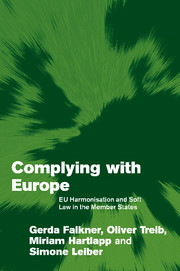Book contents
- Front matter
- Contents
- List of figures
- List of tables
- Preface
- 1 Introduction: flexible EU governance in domestic practice
- 2 Theorising the domestic impact of EU law: the state of the art and beyond
- 3 EU social policy over time: the role of Directives
- 4 The Employment Contract Information Directive: a small but useful social complement to the internal market
- 5 The Pregnant Workers Directive: European social policy between protection and employability
- 6 The Working Time Directive: European standards taken hostage by domestic politics
- 7 The Young Workers Directive: a safety net with holes
- 8 The Parental Leave Directive: compulsory policy innovation and voluntary over-implementation
- 9 The Part-time Work Directive: a facilitator of national reforms
- 10 Voluntary reforms triggered by the Directives
- 11 The EU Commission and (non-)compliance in the member states
- 12 Beyond policy change: convergence of national public–private relations?
- 13 Implementation across countries and Directives
- 14 Why do member states fail to comply? Testing the hypotheses suggested in the literature
- 15 Three worlds of compliance: a typology
- 16 Conclusions: myth and reality of social Europe
- References
- Index
12 - Beyond policy change: convergence of national public–private relations?
Published online by Cambridge University Press: 22 September 2009
- Front matter
- Contents
- List of figures
- List of tables
- Preface
- 1 Introduction: flexible EU governance in domestic practice
- 2 Theorising the domestic impact of EU law: the state of the art and beyond
- 3 EU social policy over time: the role of Directives
- 4 The Employment Contract Information Directive: a small but useful social complement to the internal market
- 5 The Pregnant Workers Directive: European social policy between protection and employability
- 6 The Working Time Directive: European standards taken hostage by domestic politics
- 7 The Young Workers Directive: a safety net with holes
- 8 The Parental Leave Directive: compulsory policy innovation and voluntary over-implementation
- 9 The Part-time Work Directive: a facilitator of national reforms
- 10 Voluntary reforms triggered by the Directives
- 11 The EU Commission and (non-)compliance in the member states
- 12 Beyond policy change: convergence of national public–private relations?
- 13 Implementation across countries and Directives
- 14 Why do member states fail to comply? Testing the hypotheses suggested in the literature
- 15 Three worlds of compliance: a typology
- 16 Conclusions: myth and reality of social Europe
- References
- Index
Summary
This chapter extends the study of Europeanisation from the sphere of policy content to policy-making patterns, specifically to public–private relations. Since the beginning of the 1990s, remarkable developments have taken place in EU social policy at this procedural level. Since this specific style of public–private co-operation is restricted to one policy area only, we prefer not to speak about ‘Euro-corporatism’ (Gorges 1996), but rather about a ‘corporatist policy community’ (Falkner 1998).
The EC Treaty's social provisions (see Articles 136–48) now contain three layers of social partner participation in the policy process. First, a member state may entrust management and labour, at their joint request, with the implementation of social policy Directives. Secondly, the European Commission now has a legal obligation to consult both sides of industry before submitting social policy proposals. And thirdly, but most importantly, management and labour may, on the occasion of such consultation, inform the Commission of their wish to conclude social partner agreements instead of proceeding with traditional EU legislation. Such agreements may, at the joint request of the signatory parties, be implemented by a Council decision based on a proposal from the European Commission. Thus, since the 1990s, the social partners have been formal co-actors in EU policy-making.
The member states of the European union are characterised by deeply rooted systems of public–private interaction that exemplify their respective processes of public policy-making.
- Type
- Chapter
- Information
- Complying with EuropeEU Harmonisation and Soft Law in the Member States, pp. 229 - 259Publisher: Cambridge University PressPrint publication year: 2005

